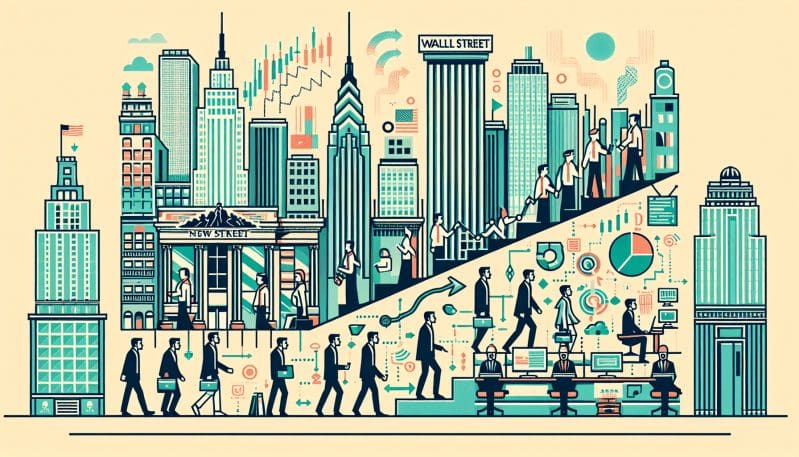The indomitable spirit of New York’s work environment is both legendary and a case study in contrasts. In the heart of the city, the iron edifices of Wall Street stand as monoliths to tradition and power in the finance world. The rhythm of the trading floor has long set a tempo marked by high pressure, competition, and notoriously long hours. This has been the hallmark of New York’s professional landscape, especially in finance and law, where the city’s identity as a global hub has attracted the best and brightest – individuals primed for battle in pinstriped suits and glistening wingtips.
But as you meander through the streets and reach the neighborhoods where the neon pulse of tech innovation beats, a different picture emerges. Welcome to Silicon Alley, New York’s burgeoning tech sector, a vibrant and eclectic mix of startups and tech giants that are redefining not just the skyline, but the very culture of the workplace. Here, the rigid hierarchy and formality of Wall Street give way to open-plan offices, bean bags, and ping-pong tables, and where work-life balance isn’t just a catchphrase, it’s a foundational ethos.
This duality is not just a tale of two cities within a city; it’s a living narrative of cultural evolution. On Wall Street, leather-bound agendas and mahogany conference tables still reign, but there’s a growing recognition that the well-being of employees cannot be counted in numbers alone. Meanwhile, in Silicon Alley, the casual attire and flexible work schedules are becoming more than just a perk; they symbolize a shift in understanding what drives creativity and productivity.
As these disparate cultures coexist, they also begin to influence each other. Finance and law firms, enamored by the success and appeal of tech company perks, are increasingly adopting more casual dress codes, and integrating flexible scheduling and remote work options. Conversely, tech companies are finding value in some of the structure and discipline that has long been a hallmark of more traditional firms.
These shifts have profound implications for recruitment. The new generation of professionals values workplace culture as much as, if not more than, salary or title. This has led to both sectors reimagining their recruitment strategies to attract top-tier candidates who are looking for more than just a job; they are looking for an experience, an opportunity to contribute to a community, and a work-life synergy that aligns with their personal values and aspirations.
Employee satisfaction, too, is being redefined. Job satisfaction is no longer solely about making it to the top of the corporate ladder. For many, it’s about having a sense of purpose, continuous learning opportunities, and feeling valued not just as an employee but as a person. Companies that recognize and foster this are finding they are not only able to attract but, critically, retain talent.
The future of workplace culture in New York is an exciting one. While the stark differences between the old guard and the new wave are still evident, a melting pot of ideals is creating a unique, dynamic business environment. Firms that once seemed worlds apart are now borrowing from each other’s playbooks, looking to create a holistic culture that supports innovation, respects tradition, and prioritizes the human element.
The evolution is ongoing, and the outcomes uncertain, but one thing is clear: New York will continue to be a microcosm of change, resilience, and reinvention. The city that never sleeps is shaping a new dream of what it means to work in the modern metropolis, and the world is taking notes.
As cultural diversity trainers, we stand at the forefront of these transformations, guiding organizations through the challenges and toward the successes of a workplace that is as diverse and dynamic as the city itself. We foster dialogues and build strategies that not only recognize the value of differences but leverage them for a more inclusive, productive, and satisfying workplace for all. Because, at the end of the day, the strength of New York’s industries – whether in finance or tech – lies in its people and the cultures they create.




























